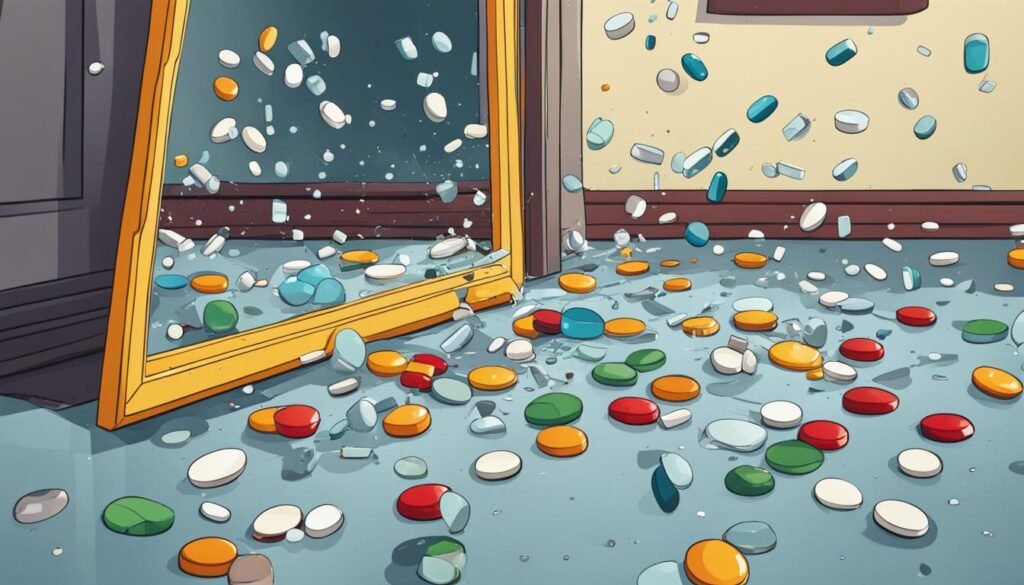It can be puzzling why addicts would relapse when their lives seem to be going well. However, substance use disorders are chronic conditions that require ongoing management. There are several common causes for relapse when things are going smoothly, including feelings of stagnation, lack of awareness, and self-sabotaging behaviors. It’s essential to understand the triggers and signs of relapse to prevent it from occurring.
Key Takeaways:
- Substance use disorders are chronic conditions that require ongoing management.
- Relapse can occur even when things are going well due to factors such as stagnation, lack of awareness, and self-sabotaging behaviors.
- Understanding the triggers and signs of relapse is crucial for prevention.
- Relapse does not mean failure; it is an opportunity for further treatment and growth.
- Seeking help and re-engaging in treatment can help individuals recover from a relapse and continue their journey to sobriety.
Signs of Drug and Alcohol Abuse Relapse
Relapse does not happen suddenly; it usually occurs in three stages. Recognizing the signs of relapse at each stage can help individuals take proactive steps to prevent it. Here are the key signs to watch out for:
Emotional Stage:
- Increased stress levels: Feeling overwhelmed and unable to cope with daily stressors.
- Negative emotions: Experiencing intense sadness, anger, or irritability.
- Isolation: Withdrawing from social activities and support networks.
Mental Stage:
- Glorifying past addictive behaviors: Romanticizing the use of drugs or alcohol and believing that it wasn’t as bad as it seemed.
- Intense cravings: Strong urges and thoughts about using substances again.
- Distorted thinking: Justifying or minimizing the negative consequences of substance use.
Physical Stage:
- Giving in to temptation: Engaging in substance use despite knowing the negative consequences.
- Loss of control: Inability to moderate or stop substance use once it has started.
- Increased tolerance: Needing higher amounts of drugs or alcohol to achieve the desired effects.
By staying mindful of these signs and seeking help when necessary, individuals can effectively manage their recovery and avoid relapse. It’s important to remember that relapse is not a failure but an opportunity for growth and further treatment.

“Relapse does not define a person’s journey; it is an opportunity for growth and further treatment.”
How to Handle a Relapse
Experiencing a relapse can be disheartening for individuals on their recovery journey. However, it’s important to remember that a relapse does not mean failure. It is an opportunity to reassess and strengthen one’s relapse prevention strategies. Here are some effective techniques for handling a relapse:
- Reach out for support: One of the most crucial steps to take after a relapse is to seek help. Reach out to a professional treatment center or a support group that can provide guidance, understanding, and accountability.
- Re-engage in treatment: Consider revisiting therapy or counseling to address any underlying issues that may have contributed to the relapse. Continuing treatment can aid in developing coping mechanisms and preventing future relapses.
- Identify triggers and develop coping strategies: Reflect on the circumstances and emotions that led to the relapse. By identifying triggers, individuals can create tailored coping strategies to effectively manage those triggers in the future.
- Focus on self-care: Prioritize self-care activities that promote physical, mental, and emotional well-being. Engaging in activities such as exercise, meditation, and pursuing hobbies can help individuals maintain a positive mindset and reduce the risk of relapse.
Remember, recovering from addiction is a journey that requires ongoing commitment and effort. Learn from the relapse experience and use it as an opportunity for growth. By implementing these relapse prevention techniques, individuals can navigate through the challenges and continue their path to lasting sobriety.
Quote:
“A relapse doesn’t mean you’re starting over; it means you’re starting from experience.” – Anonymous
Myths and Facts About Relapse and Addiction
When it comes to addiction and relapse, there are many myths and misconceptions that need to be debunked. Understanding the realities of addiction and relapse is essential for effective treatment and support. Let’s take a closer look at some common myths and the corresponding facts to gain a better understanding of these complex issues.
Myth: People turn to substance abuse only to avoid feeling bad
Fact: Addiction rewires the brain and alters a person’s behavior and thinking patterns. It is not just about avoiding negative emotions; it becomes a compulsive and uncontrollable behavior. Recovery from addiction requires addressing the underlying issues and developing healthy coping mechanisms.
Myth: Relapse is a sign of failure
Fact: Relapse is not a sign of failure but rather an opportunity for further treatment and growth. It is important to view relapse as a setback that can be learned from, rather than a complete failure. Asking for help and re-engaging in treatment can help individuals recover from a relapse and continue on their journey to sobriety.
Myth: Once an addict, always an addict
Fact: While addiction is a chronic condition, it does not mean that recovery is not possible. With the right support, treatment, and coping mechanisms, individuals can overcome addiction and lead fulfilling lives. It’s important to remember that each person’s journey is unique, and recovery is within reach.
By understanding the myths and facts surrounding addiction and relapse, we can better support and empower those on their journey to recovery. It’s crucial to provide education, compassion, and resources to individuals struggling with addiction, helping them navigate the challenges and achieve lasting sobriety.

What to Do After a Relapse
Experiencing a relapse can be disheartening, but it’s important to remember that it is not a sign of failure. Instead, it is an opportunity for growth and further treatment. If you find yourself in this situation, here are some steps you can take to regain control and continue your recovery journey.
1. Seek Help: Reach out to a professional treatment center, counselor, or support group. Having a support system can provide guidance, understanding, and accountability during this challenging time.
2. Reflect and Learn: Take the time to reflect on what led to the relapse. Identify the triggers and situations that contributed to it. By understanding the factors that led to the relapse, you can better prepare yourself for future challenges.
3. Revisit Coping Strategies: Review the coping strategies that have been effective for you in the past. Consider revisiting therapy techniques, mindfulness practices, or healthy habits that helped you maintain sobriety. Adjust and enhance these strategies based on your relapse experience.
Remember, preventing relapse is an ongoing process. It’s important to be patient with yourself and to prioritize self-care. Stay connected with your support system, practice open communication, and make use of the resources available to you. With determination and a proactive approach, you can overcome a relapse and continue your journey towards long-term recovery.
Factors Contributing to Addiction Relapse
Relapse is a complex issue that can be influenced by various factors. Understanding these factors is crucial in addressing the underlying causes and preventing relapse. Here are some key factors that contribute to addiction relapse:
- Lack of ongoing treatment and support: Addiction is a chronic condition that requires continuous care. Without ongoing treatment and support, individuals may find it challenging to maintain their sobriety, increasing the risk of relapse.
- Untreated mental health issues: Many individuals struggling with addiction also have co-occurring mental health disorders. When these issues are left untreated, they can exacerbate cravings and make it more difficult to stay on the path of recovery.
- Unhealthy relationships and environments: Surrounding oneself with people who engage in substance abuse or being in an environment that promotes drug or alcohol use can significantly increase the likelihood of relapse.
- Poor self-care: Neglecting physical and emotional well-being can weaken resilience and make individuals more vulnerable to relapse. Taking care of oneself through healthy habits, self-reflection, and self-care activities is essential for maintaining recovery.
- Pride or overconfidence: Feeling overly confident in one’s ability to stay sober can lead to complacency. It is crucial to remain humble and recognize that addiction is a lifelong battle that requires constant vigilance.
By addressing these contributing factors, individuals can strengthen their recovery and reduce the risk of relapse. It is important to seek professional help, engage in ongoing treatment, and develop healthy coping mechanisms to maintain long-term sobriety.
Importance of ongoing treatment and support
Continuing treatment and having a support system in place are vital components of relapse prevention. Ongoing therapy, counseling, or participation in support groups can provide individuals with the tools and resources needed to navigate the challenges of recovery.
“Relapse is not a sign of failure, but an opportunity for further treatment and growth.” – Substance Abuse Counselor
Through ongoing treatment, individuals can address underlying issues, develop coping strategies, and learn new skills to manage triggers and cravings effectively. These interventions can significantly reduce the risk of relapse and support individuals in their journey towards lasting recovery.
Takeaway
Relapse is a common occurrence for individuals recovering from addiction. It is influenced by various factors, including the lack of ongoing treatment and support, untreated mental health issues, unhealthy relationships and environments, poor self-care, and pride or overconfidence. By understanding and addressing these factors, individuals can strengthen their recovery and significantly reduce the risk of relapse. Seeking help, engaging in ongoing treatment, and developing healthy coping mechanisms are essential for maintaining long-term sobriety and achieving a fulfilling, addiction-free life.
Conclusion
In conclusion, preventing relapse in addiction treatment is a critical aspect of maintaining long-term sobriety. While it may be puzzling why addicts relapse when things are going well, it’s important to remember that substance use disorders are chronic conditions that require ongoing management. By understanding the causes, signs, and contributing factors of relapse, individuals can take proactive steps to prevent it from occurring.
Building a robust support system is key to relapse prevention. Engaging in ongoing treatment and therapy can provide individuals with the necessary tools and guidance to address underlying issues and develop healthy coping mechanisms. It’s essential to recognize that relapse does not define a person’s journey; rather, it is an opportunity for growth and further treatment.
By staying vigilant and committed to their recovery, individuals can overcome the challenges of relapse. Addressing triggers, seeking help when needed, and prioritizing self-care are crucial in preventing relapse and maintaining a healthy and fulfilling life free from addiction. Remember, relapse prevention is an ongoing process, and every step taken towards recovery is a step in the right direction.
FAQ
Why do addicts relapse when things are good?
Addicts relapse when things are going well because substance use disorders are chronic conditions that require ongoing management. There are several common causes for relapse, including feelings of stagnation, lack of awareness, and self-sabotaging behaviors.
What are the signs of drug and alcohol abuse relapse?
Relapse occurs in three stages: emotional, mental, and physical. The emotional stage involves negative emotions and high stress levels, the mental stage includes glorifying past addictive behaviors and intense cravings, and the physical stage is when a person gives in to temptation and starts using drugs or alcohol again.
How can I handle a relapse?
Having a relapse prevention plan is crucial. This plan includes identifying triggers and developing coping strategies for each trigger. Remember that relapse does not mean failure; it is an opportunity for further treatment and growth. Asking for help and re-engaging in treatment can help individuals recover from a relapse and continue their journey to sobriety.
What are the myths and facts about relapse and addiction?
One common myth is that people turn to substance abuse only to avoid feeling bad. The reality is that addiction rewires the brain and alters a person’s behavior and thinking. Recovery from addiction is a daily choice that requires addressing the underlying issues and developing healthy coping mechanisms. It’s important to debunk the misconceptions surrounding addiction and relapse to better understand the true nature of these challenges.
What should I do after a relapse?
After a relapse, it’s crucial to seek help and remember that it is not a sign of failure. Reaching out to a professional treatment center or support group can provide guidance and accountability. Learning from the relapse experience and revisiting the triggers and coping strategies can help individuals better prepare for future challenges and continue their recovery journey.
What factors contribute to addiction relapse?
Various factors contribute to addiction relapse, including the lack of ongoing treatment and support, untreated mental health issues, unhealthy relationships and environments, poor self-care, and pride or overconfidence. Understanding these contributing factors can help individuals address them and create a strong foundation for their recovery.

